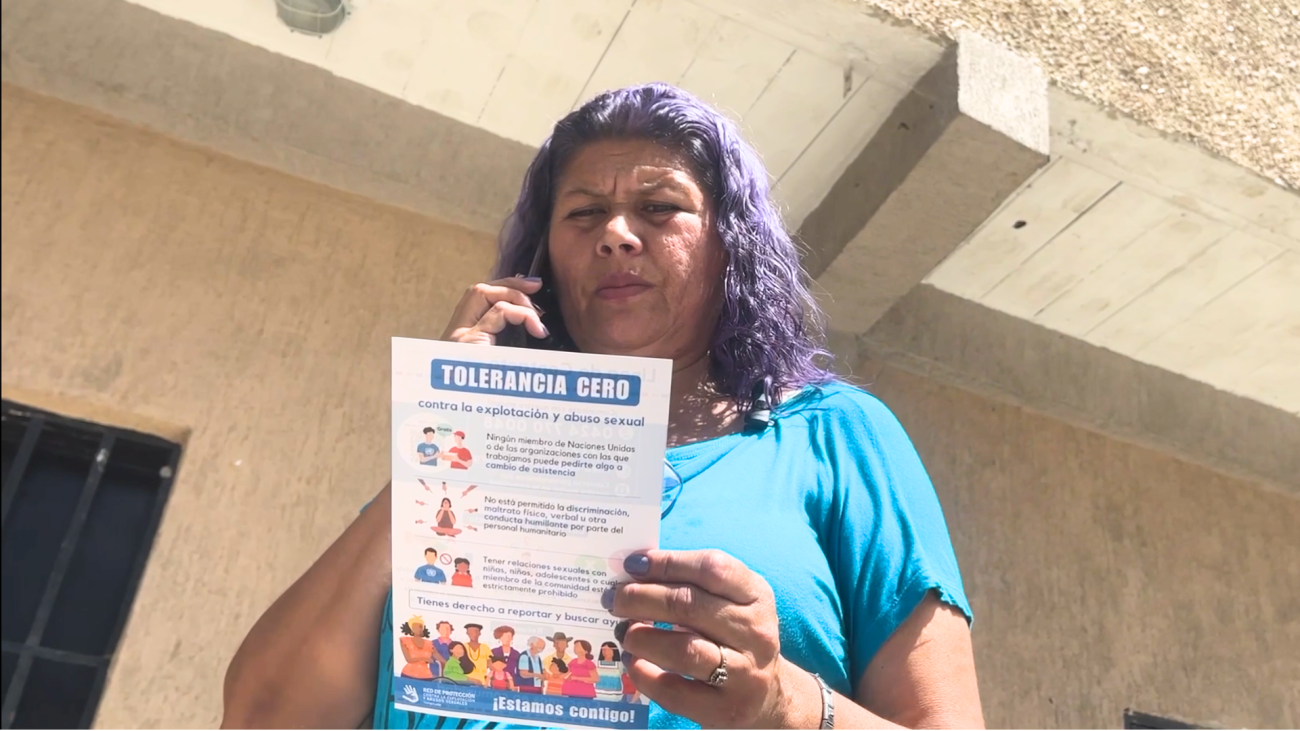United with Communities: Voices from the UN Contact Line in Venezuela

In the heart of the Antonio José de Sucre community, east of Caracas, Ivonne Medina has become a pillar of support as a community leader. She recalls her first time using the UN Contact Line, calling to seek legal information to help her community members. "I thought that maybe they wouldn't give me the answer I expected, that it would be very delayed, or that they would make any excuse not to attend to me." However, the reality was different: "The response was immediate, and they solved the problem at that moment." The effectiveness of the contact line in Venezuela- helping answer questions and doubts with a multi-channel communications service- has made it a vital resource for communities, like Ivonne’s, in vulnerable situations.
She had never used a hotline before but, in her words, "It was effective, and now that we know it exists, we will use it more."
Set up in 2021, the UN Children’s Fund (UNICEF) and the Office for the Coordination of Humanitarian Affairs (OCHA) took the initiative to start this project, using their own reporting line as a starting point for providing information and assistance to communities. The pilot project was initially carried out in two municipalities of Venezuela bordering Colombia, specifically in the Zulia state in the west of the country. In three years, it has evolved, with Resident Coordinator’s championing and the enthusiasm of agencies, to include 11 United Nations agencies with a broad national coverage. In particular, the hotline has managed to reach thousands of women between the ages of 18 to 59 years who are heading households and participating in various food security, livelihoods, nutrition and water, sanitation, and health programmes around the country.

Gianluca Rampolla, Resident Coordinator and Humanitarian Coordinator of the United Nations system in Venezuela, explains that the Line arose from the need to create a mechanism of transparency for accountability: "We are seeking tools to complement our efforts in fostering accountability to affected populations and to create a mechanism that facilitates communication and conversations with the communities where we work." This effort has allowed for closer proximity to the communities, expanding the scope of communication and making real-time adjustments to programs based on local needs and preferences, creating links among UN partners, such as non-governmental organizations and the Red Cross Movement.

Since its initiation, over 43,000 people have contacted the team through the five communication channels offered: toll-free phone calls, WhatsApp, SMS, email, and face-to-face interactions.
The Contact Line features a multidisciplinary team that ensures its operation. This includes the Project Officer, responsible for operations and overall coordination; the Associate for Community Communication and Information Management, in charge of communications and reports; three operators who handle calls and inquiries; the Contact Line Working Group, formed by the focal points of each agency involved; and the Executive Committee, composed of representatives from each agency participating in the Line.
When contacting the Line, relevant information is meticulously collected and safeguarded. Subsequently, this information is directed to internal specialized teams to provide a personalized response, using internal feedback to continuously optimize our processes. All in all, the Contact Line has 19 referral and assistance routes connected with the humanitarian and development architecture to link those in most need. According to Abner Lugo, Project Officer of the Line, "We ensure the confidentiality and security of the individuals who contact us. The mere fact that people take the step to use one of these channels to report a sensitive situation or sometimes, damage committed to them, requires that we are committed to always protecting their identity."

Hearing first-hand from communities and stakeholders ensures that there is room for continuous learning, trust-building and transparent communication.
"Recently, many doubts began to arise about the Safe Mobility program; we realized that although there was information available, it might not have been clear for those trying to access the program. Consequently, we started jointly designing a series of key messages with the IOM to help users better understand the profiles, how the program was being conducted, and essential data that could make accessing it much more manageable," shares Martha Rivera, UNHCR focal point for the Contact Line.
Ivonne expresses her satisfaction with the Contact Line: "It is the best tool we have been given because many times, we encounter cases that we cannot solve no matter how much we want to, and this contact gives us the solution."

Reflecting on the future of the Line, Mr. Rampolla says, "It is an innovative initiative that we intend to deepen and expand, as we are here to work in the communities, with the community. It is essential for you [the communities we serve] to be able to say what is missing and how we can help you and for us at the UN to listen to you and improve our work."
The United Nations Contact Line in Venezuela has proven to be an effective tool for communication, feedback, and issue resolution in vulnerable communities, paving the way towards more coordinated and transparent UN support, centered on the everyday lives and experiences of people.
For more information about the UN's work in Venezuela, visit venezuela.un.org













